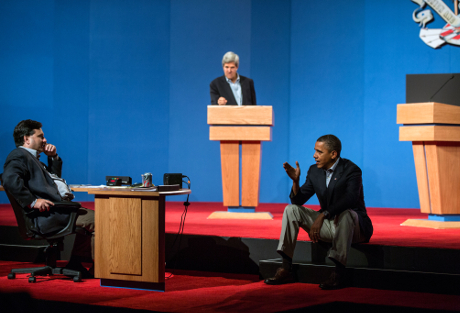Blog

With two months to go until the 2015 general election (we can barely contain our excitement!), the issue of David Cameron’s attendance to the televised TV debates has become quite the ‘talking’ point.
Cameron is more than happy to have a seven-way (easy!) debate before the campaigning kicks off, but is reluctant to have any debates during the campaign, which includes a head-to-head debate with Ed Miliband. Cameron pointed out that he debates with Ed Miliband every week in the House of Commons (tune into BBC Parliament at 12.30pm on Wednesdays to catch the latest episodes in TV’s longest running public schoolboy drama), but he’s also said in the past that “Blair pulled out against Major and Major pulled out against Kinnock, Thatcher pulled out against Callaghan. I’ve just always believed that these need to happen. It’s good for democracy.” Uh-oh, is Cameron now going to pull out against Miliband? Don’t say it if you don’t mean it, Dave.
Regardless of the political missiles that can be thrown around, Ed Miliband has said that TV debates in the run up to a general election should be guaranteed by law. Though Alex Salmond joked that this would result in David Cameron in cuffs and being carted off to Wandsworth, such a move would have significant constitutional ramifications for the UK. The occurrence of the TV debates would become a statutory right of voters, as is the right to vote as outlined in the Representation of the People Act 1969.
Whilst these proposals can be viewed as a development of democracy, opponents have also said that it prohibits the free choice of a party leader to wilfully participate in a debate. There’s also the opinion that just because Cameron isn’t satisfying Miliband’s desire (again, easy!) of partaking, making it a legal obligation is borderline totalitarian.
TV debates are a relatively new introduction to British politics, but they’ve been present in American politics since 1960. However, they encountered relatively little legal trouble but have never been guaranteed by the constitution. Congress had to suspend a provision of the Communications Act of 1934 that deemed “any person who is a legally qualified candidate for any public office… shall afford equal opportunities to all other such candidates for that office in the use of such broadcasting station”. This, and actions from the Federal Communications Commission, have been the only legal measures surrounding the presidential debates – they are not mandatory constitutionally and are considered a de facto part of the election process.
So, if Labour were to 1) achieve power, and; 2) put the wheels in motion for enshrining the TV debates into law, how would it materialise. Currently, there are rules regarding the number, length and timing of Party Political Broadcasts (PPB). Section 333 of the Communications Act 2003 outlines how OFCOM can determine “the political parties on whose behalf party political broadcasts may be made… [and] the length and frequency of the broadcasts”.
OFCOM essentially outsource this responsibility to the broadcasters, as outlined in their rules on Party Political and Referendum Broadcasts. “The precise length, frequency, allocation and/or scheduling of broadcasts offered to political parties/designated organisations are the responsibility of Licensees.”
It would be straightforward enough for Labour to amend the Communications Act 2003 to include legislation on election debates. Additionally, OFCOM could amend their rules on Party Political and Referendum Broadcasts to include election debates. Labour are also keen on establishing the Broadcasters’ Liaison Group (the members of whom consist of the BBC, ITV, Channel 4 and Sky) as a trust, so that it is legally allowed to decide dates, format and attendees of the debate. These powers would be very similar to the ones they already wield in the OFCOM rules.
So, what would happen if laws to this effect came in and people like David Cameron still refused to participate? Currently, if there’s a dispute between Party and broadcaster, OFCOM rules that “If any dispute remains unresolved… as to the length, frequency, allocation and/or scheduling of broadcasts it may be referred… to Ofcom for determination.”
Hypothetically, if a party and/or their party leader opposing the debates based on them being too close to the election campaign, OFCOM would be responsible for solving the dispute. It’s impossible to say when speculating legislation, but there may not be a legal obligation for the leader to attend a debate. However, the debate would go ahead regardless, meaning that an ‘empty chair’ scenario would occur.
Academy tools to help you get a job
-

Free Watson Glaser Practice Test
Understand the test format, compare your performance with others, and boost your critical thinking skills.
